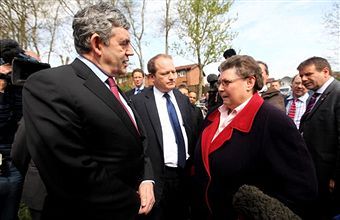 Whoever wins Labour’s leadership, whether it’s a breed of Miliband or Balls, its future
will be dominated by its understanding of how it found itself on opposition benches. Philip Gould, Tony Blair, Gordon Brown and the other progenitors of the New Labour project – were wrong. Their
fatal assumption was that their core vote, the working classes, had no-where else to go. Labour, therefore, could reach out the middle classes, broadening their support and thus New Labour was
born.
Whoever wins Labour’s leadership, whether it’s a breed of Miliband or Balls, its future
will be dominated by its understanding of how it found itself on opposition benches. Philip Gould, Tony Blair, Gordon Brown and the other progenitors of the New Labour project – were wrong. Their
fatal assumption was that their core vote, the working classes, had no-where else to go. Labour, therefore, could reach out the middle classes, broadening their support and thus New Labour was
born.
At first their calculations were correct. Two slogans, “Education, Education, Education” and “Tough on Crime, Tough on the Causes of Crime” brought together the two separate demographics to create a powerful – and seemingly unstoppable – election winning machine.
Yet, as the 2010 election proved, Labour’s core vote did have somewhere else to go – or rather, they could, if they wanted, simply stay at home – and so they did. The reasons, according to the research, pointed to extreme hostility to immigration and the EU from those working class voters Labour had taken for granted. In the final analysis, Gordon Brown took Labour too strongly in the direction of socialist style spending and neglected the socially conservative elements of the New Labour programme that their own voters valued more.
Both Ed Balls and Ed Miliband have expressed the problems their own voters experience from immigration. One example is that of builders – for the middle classes, so the argument goes, a cheap polish builder is a wonderful thing, freeing up resources to be spend on other things, or allowing more work to be done. For a British builder being undercut, it’s a terrible thing, as they sit idle because they can’t – or won’t – compete on price. What then is the solution for Labour seeking to resolve these types of problems?
Whatever solution they offer, it will no doubt be dressed up in the language of care, of concern, of compassion. It will be ‘progressive’ and cool and new and not at all like those nasty horrible Libservatives and their cuts. Underneath, however, their policies are going to have the toxic smell of nationalism and economic protectionism. Labour will never again want to find itself on the side of those people looking for cheap but competent builders when their own voters are demanding special treatment and favours from the State.
The Coalition, if nothing else, offers Labour the opportunity to outmanoeuvre both the Conservatives and the Liberal Democrats as being too pro-EU, pro-Immigration, soft on Terrorists and criminals and, worst of all, cold and unfeeling about economic hardship. Indeed, such a Coalition could not make itself a more easy target for an opposition with no more coherent ideology than pure, unthinking populism dressed up as political party simply to win power and glory for those that control it.
Oppositions always define themselves in relation to those that they oppose. If the Conservatives could find themselves on the side of Shami Chakrabarti as defenders of Civil Liberties instead of an expedient and populist assault on Labour for not going far enough, so Labour could find themselves on the side of the ‘ordinary British worker’ and against everyone else. “British jobs for British workers” may signal a much more innocent, less ugly age by contrast.
The only hope is that a Labour Party that takes such an easy route to win back the support of the working classes may well find that those middle classes they’ve fought so hard to keep turn away in disgust.






Comments